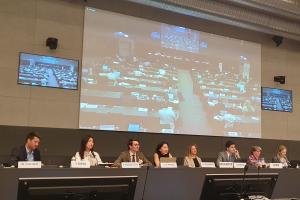Young professionals from industry, academia, and civil society came together to discuss and explore solutions for sustainable resource management at the UNECE Resource Management Week 2023. Hosted by the UNECE Resource Management Young Member Group (RMYMG), the highly interactive session provided a platform for intergenerational collaboration to discuss ideas around fostering a culture of sustainability and innovation in resource management.
The future availability of resources affects everyone. "Young people should be at the forefront of policymaking on an international, national, and regional level to address climate change and promote sustainable development," said Ghadi Sabra, the lead organizer of the Resource Management Young Member Group.
UNECE is the first UN body to dedicate a high-level meeting exclusively to young speakers on how young professionals can contribute by shaping the future of sustainable resource management for future generations. "54% of the extraction of clean energy resources will take place on Indigenous land. We need to strike a balance between the needs and interests of current and future generations to attain fairness and justice for intergenerational equity," said Jodi-Ann Wang, Senior Climate Policy Analyst at the UN Principles for Responsible Investment.
Sustainable resource management today is informed by social norms and good practices, but more action and implementation is needed. “We must scale up positive initiatives, such as the circular economy, to accelerate the rapid social change needed to educate people and put sustainable resource management into practice," underlined Yuhan Zheng, a PhD student at the University of Galway.
Amidst the pressing need to address the growing demand for clean energy, Markus Fischer, an RMYMG member, pointed out that "data shows half a million jobs will be needed for the production of clean energy, such as heat pumps, solar panels, and others across Europe by 2030." Furthermore, as the extraction and management of new resources become more critical, he highlights that "this skill shortage provides a huge opportunity for young people to take advantage of the green transition."
If we want to make sustainable resource management a reality, Vadim Kuznetzsov, BRICS Youth Energy Agency's Director for Sustainability and Climate emphasizes that we need stringent environmental standardization, norms, and regulations, and environmental, social, governance on a multilateral level. He notes that "Europe is making progress on improving the capacity of modern energy for all by 2030, but it will come at a large environmental cost. We still lack an agreed international environmental code for deep sea mining."
With the ongoing Global Stocktake of the Paris Climate Agreement, the session explored how creating supportive frameworks, such as the United Nations Framework Classification for Resources (UNFC), can provide the basis for environmental and socio-economic considerations built into decision-making for intergenerational equity.
In closing the session, Bianca Derya Neumann, Prognos AG, highlighted “Young people can help make others aware of how they can get involved in international decision-making to support the implementation of UNFC. Youth is important to encourage UN standards to be taught in universities and encourage usage in industry and government.”
Members of the Youth Group called on more young people to engage with the resource management community, where a range of resource industries and sectors play a role. This event was part of the UNECE Resource Management Week 2023, incorporating the 14th Session of the UNECE Expert Group on Resource Management.


